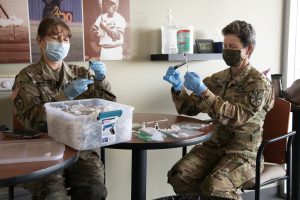- Slug: BC-CNS Arizona COVID Update, 865 words.
- 1 photo and caption below.
- 1 graphic here.
By Kevin Pirehpour
Cronkite News
PHOENIX – Winter storms engulfing much of the U.S. are delaying shipments of COVID-19 vaccines and supplies, forcing delays to long-awaited appointments for some residents of Arizona.
The delays are the latest obstacle for health officials in the COVID-19 vaccination rollout, which has had to overcome misinformation, skepticism and ongoing scheduling issues.
Shipments of both approved vaccines, as well as such supplies as syringes and needles, are “really limited due to the weather that is being experienced across the country,” Dr. Marjorie Bessel, Banner Health’s chief clinical officer, said at a press conference Wednesday.
“Over the next several days,” she said, “we will continue to work with all of our different states and counties to load and balance those vaccines and supplies to best meet the needs of communities.”
Banner Health, headquartered in Phoenix, serves more than 1 million patients a year in six states.
The widespread shipment delays are affecting hospitals and vaccination sites across the country, as snow and ice grips broad swaths of the country, causing widespread power outages and coating roads with sheets of ice and snow. The situation prompted the Centers for Disease Control and Prevention on Tuesday to warn of “widespread delays in COVID-19 vaccine shipments and deliveries over the next few days.”
Across Arizona, an estimated 1,505,575 doses of Pfizer or Moderna vaccines have been administered as of Feb. 16, and about 12% of Arizonans have received at least the first dose.
As of Wednesday, Pima County – which runs along part of the U.S.-Mexico border and is home to Tucson and much of the Tohono O’Odham Nation – was the hardest-hit county, Bessel said, with only enough vaccines and supplies to make it through Thursday at Banner facilities. Appointments scheduled for Friday, Saturday and Sunday might need to be rescheduled if supplies don’t arrive in time.
Banner facilities in Maricopa County, Pinal County and Coconino County all have enough vaccines and supplies to make it through this week’s appointments, Bessel said.
In Gila County, Bessel said, Banner is “slightly short” of vaccines and supplies needed to cover current appointments.
Despite delays, there’s a measure of security for those who have already received their first dose, Dr. Joshua LaBaer, director of the ASU Biodesign Institute, said Wednesday in a separate press conference.
“Push comes to shove, if (the second dose is) delayed a week or two weeks, that’s not going to severely affect the outcome,” LaBaer said. “In fact, you can really even get out to 42 days (after the first dose) if you have to.”
Overall, he said, the number of COVID-19 cases in Arizona is “moving in the right direction” on a downward trajectory, despite 1,000 to 2,000 new cases being recorded per day across a seven-day average.
In early January, Arizona hit a record single-day high of 17,200 new reported cases, the Arizona Republic reported.
At Valleywise Health facilities, the decline in COVID-19 patients has allowed the health system to increase its capacity for elective procedures, which are nonemergency procedures that are scheduled in advance, Dr. Michael White, Valleywise’s chief clinical officer, said at another press conference Wednesday. Valleywise, based in Phoenix, is a public health teaching system.
As of Wednesday, White said, Valleywise was treating 30 COVID-19 patients, with four in intensive care. In mid-January, Valleywise was treating about 120 COVID-19 patients, 35 of them in the ICU.
“The decrease has been welcomed,” White said. “And it’s something that we hope that we can sustain.”
LaBaer is encouraged that the vaccines appear to be effective.
“For those people who have been vaccinated, we are not seeing any severe illnesses,” he said. “No one going to the hospital, no one in the ICU, no one dying.”
Recently, the Centers for Disease Control and Prevention has changed recommendations for those who are fully vaccinated but are exposed to someone who has the coronavirus that causes COVID-19.
Any person who has received both doses of the vaccine, is within a 3 month window of the last dose and is asymptomatic after a COVID-19 exposure does not need to be quarantined, according to updated CDC guidelines.
“And I think that’s largely because the evidence, strong evidence that vaccinations significantly reduce the likelihood that you’re going to get infected, let alone get a severe infection,” Labaer said.
In recent weeks, some concern has surfaced about the vaccine’s overall effectiveness against new coronavirus variants, such as the U.K variant.
“Those vaccines appear to be effective at preventing severe illness among individuals who’ve acquired the variants – the U.K. variant, the South African variant, the Brazilian variant – it still seems to prevent severe illness and those individuals, and that’s important news,” LaBaer said. “They may still get infected, but they don’t appear to be getting severe illness.”
Banner Health is notifying patients of any scheduling changes by phone call, text message or email.
Despite the current obstacles, however, the “long-term outlook here is really quite good,” LaBaer said.
“There really is a light at the end of the tunnel in terms of getting back to normal life,” he said. “We just have to make it through the next coming months while we’re still trying to get these vaccines rolled out and into people’s arms.”
For more stories from Cronkite News, visit cronkitenews.azpbs.org.
^__=
